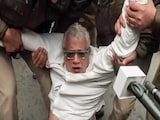A nasal COVID-19 vaccine will be easy to be give to school-going children who bear a "very mild" load of the disease but they are infectious, AIIMS Director Randeep Guleria said on Wednesday.
The noted pulmonologist, who was interacting with the personnel of the National Disaster Response Force (NDRF) during their 16th Raising Day celebrations here, also said that people who have contracted coronavirus should also get the jab about 4-6 weeks after recovery.
"It (coronavirus infection) is very mild in children but they are infectious. They can spread the disease."
"The vaccines that have come are not approved for children because there have been no studies conducted on children but this (vaccination) is a very important step and trials are being done," he said.
Once children start going to the school regularly and they contract the COVID-19 infection, they will not have much problem but if they bring it home they can spread it to their parents or grandparents, the chief of the premier Delhi-based All India Institute of Medical Sciences (AIIMS) said.
"Vaccines for children may come later...Bharat Biotech is trying to get approved a nasal vaccine. Such a vaccine will be very easy to be given to children as it is a spray and not a jab and hence compliance is more."
"In half-an-hour you can vaccinate an entire class. So, if that (nasal vaccine) is approved it will be even easier to give the vaccine (for COVID-19)," Mr Guleria said in reply to a question.
He was also asked by the NDRF personnel if a person who has recovered from COVID-19 should get vaccinated with India commissioning two vaccines last week.
"A vaccine jab is essential for them (recovered from coronavirus) due to two reasons."
"One is you are not sure how strong is your post COVID-19 immunity and it has been seen quite a few times that those who had a mild to moderate infection their anti-body response has been less and we also don''t know how long will it be," he said.
A vaccine will be "beneficial" for such an individual as it will act as a "booster" and if anti-bodies are depleting, with the vaccine it will be back to a high level, he said.
"So, you should get the vaccine if you have been infected with COVID-19 but if it has happened recently say like 7-10 days then one should wait and take the jab after may be 4-6 weeks," he said.
Before replying to queries, Mr Guleria also gave a powerpoint presentation on the topic "Infectious Diseases: Emergencies and Challenges Ahead" and said "bio-terrorism" is an upcoming challenge.
He said densely populated countries like India "provide an opportunity" for the outbreak of infectious disease emergencies as it is coupled with the phenomenon of crowding and urbanisation.
He batted for having a "very good surveillance system" to better combat coronavirus like diseases and epidemics.
He said the country did "aggressive" work with a strong political will in the aftermath of the COVID-19 outbreak and said the need of the hour was to have lab-based surveillance and more and more trained public health officials.
"We need to enhance our research capacity and we should not forget what we learnt during coronavirus outbreak," Mr Guleria said.
World Health Organisation (WHO) chief scientist Soumya Swaminathan also addressed the personnel of the central force through an online link and said a good digital surveillance system should be in place to better deal with public health emergencies.
She said a resilient health workforce was required as it was seen during COVID-19 outbreak that regular health services were "disrupted" as the manpower had to be "diverted" to combat the raging pandemic.
Swaminathan said a robust infection prevention and control system was required, especially for healthcare workers, for battling medical emergencies as it was seen that a major brunt is borne by these professionals during disease outbreaks like COVID-19 as they bear the "highest risk of exposure".
NDRF chief S N Pradhan, while speaking during the event, said his rescuers faced the "double whammy or double challenge" of combating a disaster within a disaster last year.
He was implying the deployment of the force during rescue operations like battling cyclones, a gas leak incident in Vishakhapatnam, floods in various states and other calamities even as COVID-19 continued to spread.
The National Disaster Response Force was raised on January 19, 2006 as a federal contingency combat wing to undertake specific tasks of relief and rescue during natural and man-made disasters or life threatening situations.
(This story has not been edited by NDTV staff and is auto-generated from a syndicated feed.)














